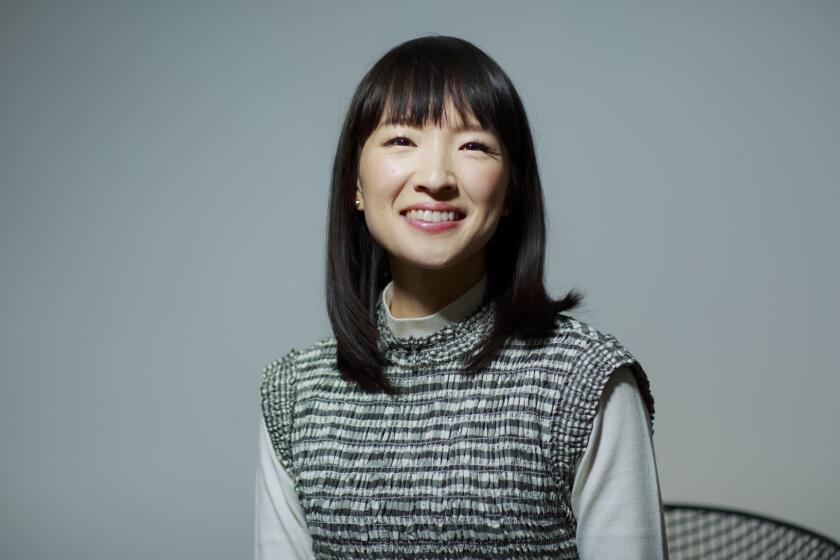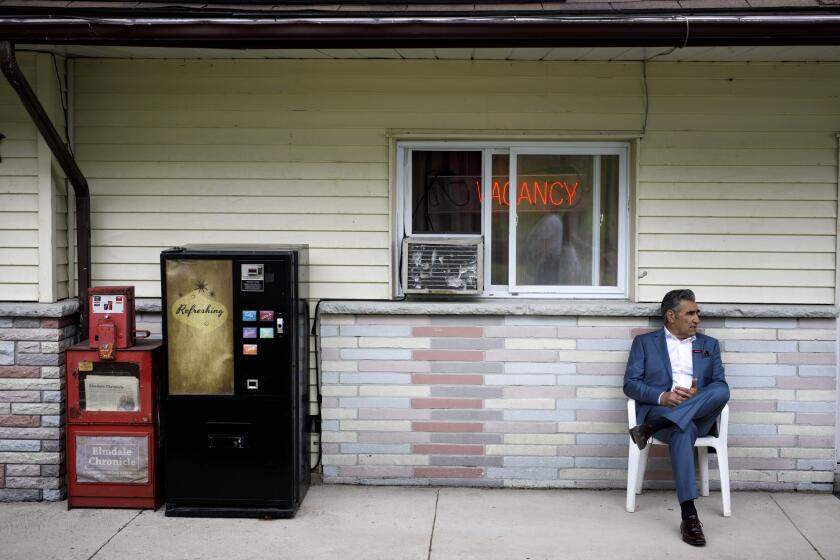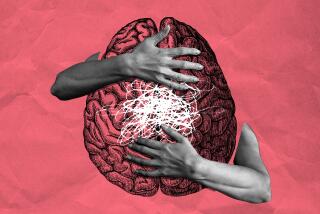Netflix wants to help you sleep. Why wellness is the next front in the streaming wars
“When was the last time that you stopped?” Andy Puddicombe asks in the first episode of “Headspace Guide to Meditation.” “That you were still? That you put down your phone and you got rid of all of the distractions around you? When was the last time you did nothing? And by nothing, I really mean nothing.”
For most people staggering through the modern world’s ongoing information blitz, it’s a pointed, even shameful, question — and it’s one that Puddicombe is used to asking. He’s the co-founder of mindfulness and meditation company Headspace, known predominantly for its app, which has 65 million downloads and counting. But although Puddicombe has made it his life’s mission to ask questions like these, usually in a guided session through your phone, this time he’s delivering it on a platform you might not expect: Netflix.
Released in January, “Headspace Guide to Meditation” is the first in a three-program partnership with the streaming giant, with the second, “Headspace Guide to Sleep,” premiering Wednesday. (The third project, with no details except that it’s an “interactive” series, is due later this year.) So far, the installments aren’t really “shows” at all — they’re more like seminars. Each brief episode begins with a lesson about some aspect of mindfulness and ends with a guided meditation.
L.A. County is offering residents a free subscription to Headspace, a mindfulness and meditation app.
With soft animation and buoyant electronic music, the series offer a pleasant counter to an increasingly draining world, and perhaps a foundation for exploring healthier habits for navigating the attention economy. And then the credits start to roll, and Netflix inevitably autoplays the next episode — to get you to binge meditate. In short, it’s an odd media pairing if there ever was one.
“We really strongly believe we want to meet people where they are on their journey,” says Morgan Selzer, Headspace’s head of content. She’s been at the forefront of the company’s broadening media initiatives, which include a full podcast slate, pep talks from Kevin Hart and a series of shorts created with “Sesame Street,” designed to help children “be more mindful.”

Selzer is on a video call with Eve Lewis Prieto, Headspace’s director of meditation and the host of the “Sleep” series, in which she gently coaches you with strategies for a better night’s rest. Along with Puddicombe, Prieto is one of several teacher voices available on the app, which means that, if you’ve spent time using it, the experience of being introduced to her can feel a little like déjà vu.
“I tell my husband that I go to bed with lots of people every night,” she jokes, taking the call from the Headspace office in Santa Monica.
Prieto began working for the company in 2013, soon after she reached a breaking point as an “anxious advertising professional.” “It wasn’t a particularly good period of my life,” she says. “I’d experienced a lot of challenges in my family, I was in a lot of debt, and I was really, really stressed. But I wasn’t necessarily aware that I was really stressed. I just thought that was how you felt when things were going really badly.”
A friend recommended the Headspace app, and after some insistence — “she’s a good friend,” Prieto says — she gave it a try. It clicked. “I’ll never forget my first session: I just had this immediate sense of, ‘Wow, I don’t need to feel like this all of the time.’”
Selzer says she’s also a convert, having been recommended the app by her mother while dealing with postpartum issues. She joined Headspace in 2019 after spending seven years in program development at cable TV network CMT, and her assignment in some ways was to bridge her past and present jobs. “I think it was the idea of taking my background in storytelling,” she says, “and, as I call it, hiding the vegetables — finding entertaining and insightful ways to get people excited about being mindful, because we know how helpful it can be.”
Marie Kondo has seen your efforts. The Mt.
Around the time Selzer started this work, Brandon Riegg, vice president of unscripted and documentary series at Netflix, was looking for a new health and wellness program to add to his roster — and he was also meaning to start meditating more (a 2020 New Year’s resolution). The programs he develops take many forms, be it “Love Is Blind” or “Tidying Up With Marie Kondo,” so when Headspace, working together with Vox Media Studios, pitched his team on an unorthodox approach, he didn’t hesitate: “It was maybe divine intervention,” he says.
Netflix regularly experiments with the possibilities of streaming, clearly savoring the platform’s ubiquity to circumvent traditional limitations of genre and format. That means more offerings like “Black Mirror: Bandersnatch,” a choose-your-own-adventure film, and “The Midnight Gospel,” an animated adaptation of philosophical podcast conversations. “Here, there aren’t any real rules,” says Riegg.
One might trace the Headspace programs’ lineage back to educational public access programming like Bob Ross’ “The Joy of Painting,” but when it’s queued up on your screen, and an affable British man is helping you focus on your breathing, it’s hard to say what the product really is. Self-help? Entertainment? Is it even television at all?
“It is sort of a hybrid experiential … thing that we’re creating,” says Selzer. “And it’s something that, when we were developing it with the team at Netflix, admittedly we all said, ‘This has never been done before.’ We don’t know what to call it.”
Mindfulness and meditation may be new to Netflix, but business has been booming for some time. Tethered to an increasing level of societal burnout, meditation is projected to be a $2-billion industry by 2022, with Headspace alone having raised over $200 million in funding to date. (It was only 11 years ago that the entire company was essentially just Puddicombe and Richard Pierson, his business partner, organizing in-person meditation conferences.)
And of the major players in entertainment, it’s not just Netflix getting into the game. Calm, Headspace’s main competitor, released a series last year on HBO Max, “A World of Calm,” which features documentary scenes of placid beauty designed to make you chill out for 20 minutes at a time. There’s no interactive or educational element with this one — it’s more like “Planet Earth” on Xanax, narrated by A-list celebrities such as Zoë Kravitz and Keanu Reeves.
Grab your edibles and press play: Hulu’s highly entertaining new docuseries is the perfect binge to celebrate 4/20.
The meditation/mindfulness expansion “is not ahistorical,” says Diana Winston, the director of mindfulness education at the Mindfulness Awareness Research Center at UCLA. She notes that, in the development of Buddhism in particular, there have been several relatively recent waves of expanded outreach as teachings have spread from the initial privacy of monasteries. “But what hasn’t happened is this level of technology.”
Winston herself works on UCLA’s mindfulness app and podcast, so she knows technology can be used for good in her field. “It’s something that we find to be really valuable for students,” she says. She sees the trend as a reflection of the culture, in the same way that each form of Buddhism usually reflects its location in some way. “It adapted to a different, very consumer-driven culture [here]. So I don’t judge it. I just think it’s sort of funny. Like, it makes sense to me that that’s what would happen.”
Before starting Headspace, Puddicombe spent a decade of his life in various Buddhist monasteries, a decision spurred by a series of deaths of people close to him. In the early days of the company, Pierson had to convince him to make the guided meditations available in any digital format whatsoever.
Since that time, though, he’s embraced his role as an unlikely impresario of meditation practices across the globe. You’re likely to find him on places like “The Tonight Show,” leading a nationwide meditation session with Jimmy Fallon, or on “Ellen,” sending every guest in the studio audience home with a lifetime Headspace membership (and also a $150 Visa gift card, for some reason). Even if distractions like television may be a cause of the very problems that he’s trying to help people combat, Puddicombe still thinks it’s a net positive to approach the issue at the source.
Season 6 of “Schitt’s Creek” promises to be emotional. The cast says filming it was plenty hard.
“When we launched the app almost a decade ago, some people were skeptical about learning meditation on a smartphone,” he writes in an email to The Times. “But for many it has been life-changing. The move to TV is similar in many ways. At first glance, it may not seem like the most obvious platform for learning meditation, yet it’s been incredibly effective, and the feedback we’ve received from viewers has been extraordinary — both moving and inspiring in equal measure.”
Asked about where, exactly, she feels Headspace fits into the sprawling Netflix megaverse — among the superhero shows, the true-crime documentaries, the Adam Sandler movies, and on and on — Prieto hopes, for some, that the shows might end up in the comfort-viewing section, after they’ve been digested for the first time, anyway. “I’ve watched ‘Schitt’s Creek’ now, like, three times,” she says with a laugh. “With these two shows as well, there’s really encouragement to go back and watch again. … Within mindfulness, no two moments are really the same.”
‘Headspace Guide to Sleep’
Where: Netflix
When: Any time, starting Wednesday
Rating: Not Rated
More to Read
The complete guide to home viewing
Get Screen Gab for everything about the TV shows and streaming movies everyone’s talking about.
You may occasionally receive promotional content from the Los Angeles Times.








